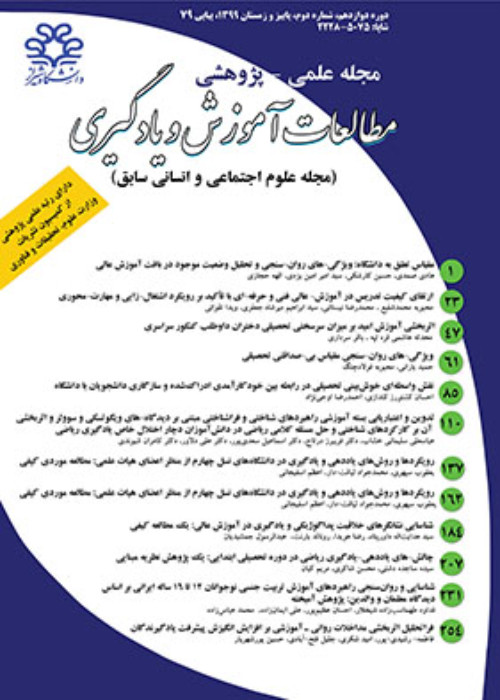Investigating the mediatory role of goal orientation in the relationship among self-efficacy, task value and cognitive strategies
Author(s):
Abstract:
IntroductionUnderstanding the cognitive and motivational processes and their mutual relationship is one of the important topics in educational psychology. In recent decades motivational theories are increasingly considered in educational fields. The relevant literature indicates that through considering both motivational and cognitive parameters, one could more objectively and realistically explain the academic achievement. There are three prominent theories in motivational literature: Social-Cognitive Theory (Bandura, 1986), Goal Orientation Theory (Ames, 1992; Dweck & Leggett, 1988; Nicholls, 1984) and Expectancy-Value Theory (Eccles et al., 1983; Wigfield, 1994; Wigfield & Eccles, 1992). Self-efficacy, as a key element of social cognitive theory, appears to be a significant variable in student's learning because it affects students’ motivation and learning (Pajares, 2006; Schunk, 2003). According to Expectancy-Value Theory, students’ beliefs in terms of the degree to which they believe that the academic task is worth pursuing (task value) is also one key component for understanding students’ achievement behaviors and academic outcomes. Goal orientation is related to the purpose of achievement behaviors. It is represented by different ways of approaching, engaging in, and responding to achievement type activities (Ames, 1992; Dweck & Leggett, 1988). Research has shown that the adoption of achievement goals is driven by differential antecedents and leads to differential patterns of cognitive, affective, and behavioral consequences (Elliot, 1999; Schunk et al., 2008). Also, individuals’ self-efficacy and task value are posited to have direct influences on their achievement goals (Elliot, 1999; Wigfield, 1994). Therefore, in order to investigate such subtle relationships among these constructs, this study examined the relationship among self-efficacy, task value and cognitive strategies through the intermediation of goal orientations. Research questions1- Which cognitive strategies can be predicted by self-efficacy and task value?2- What is the impact of goal orientations on each of the cognitive strategies?3- Can all the kinds of goal orientation mediate between self-efficacy, task value and cognitive strategies?4- Which kinds of goal orientations are more dominant among the Iranian students? MethodIn order to assess the research variables, two instruments including Achievement Goal Questionnaire (Elliot & McGregor, 2001) and three subscales of self-efficacy, task value and cognitive strategies from motivational strategies Learning Questionnaire (Pintrich et al, 1991) were administered to a sample of 365 first year high school students (192 girls and 173 boys) in shiraz, who were selected via multistage cluster sampling method. The data were analyzed by path analysis.ResultsThe results of path analysis showed that self-efficacy and task value affected cognitive strategies both directly and indirectly by certain of goal orientations. Thus self-efficacy and task value predicted all the cognitive strategies positively through the intermediation of mastery approach goal orientation. There was no significant relationship between mastery avoidance goal and two exogenous variables and this goal predicted none of the cognitive strategies. Self-efficacy affected performance approach goal and this goal in turn predicted elaboration strategy positively. Performance avoidance goal was negatively predicted by self-efficacy and this goal predicted rehearsal strategy positively. Also predominant goal orientations within the students were mastery approach and performance approach goal orientations. DiscussionThe aim of this study was to investigate the role of goal orientation in mediating motivational beliefs (self-efficacy and task value) and cognitive strategies. The findings indicated that singly, mastery approach goal orientation could mediate between self-efficacy, task value and all kinds of cognitive strategies. Performance approach and performance avoidance goals could mediate between self-efficacy and some of the cognitive strategies but mastery avoidance didnt have any effect in this regard. Thus, self-efficacy and/or task value could be considered as antecedents of goal orientations that lead to use of various cognitive strategies. Also, the results indicated that each of the goal orientations has distinct pattern of cognitive consequences. Another finding was that the dominant goal orientations among the Iranian students were mastery and performance approach goal orientations. Overall, the results of the study were compatible with the previous research in other cultures.
Keywords:
Language:
Persian
Published:
Studies in Learning & Instruction, Volume:4 Issue: 2, 2012
Page:
49
magiran.com/p1151253
دانلود و مطالعه متن این مقاله با یکی از روشهای زیر امکان پذیر است:
اشتراک شخصی
با عضویت و پرداخت آنلاین حق اشتراک یکساله به مبلغ 1,390,000ريال میتوانید 70 عنوان مطلب دانلود کنید!
اشتراک سازمانی
به کتابخانه دانشگاه یا محل کار خود پیشنهاد کنید تا اشتراک سازمانی این پایگاه را برای دسترسی نامحدود همه کاربران به متن مطالب تهیه نمایند!
توجه!
- حق عضویت دریافتی صرف حمایت از نشریات عضو و نگهداری، تکمیل و توسعه مگیران میشود.
- پرداخت حق اشتراک و دانلود مقالات اجازه بازنشر آن در سایر رسانههای چاپی و دیجیتال را به کاربر نمیدهد.
In order to view content subscription is required
Personal subscription
Subscribe magiran.com for 70 € euros via PayPal and download 70 articles during a year.
Organization subscription
Please contact us to subscribe your university or library for unlimited access!


